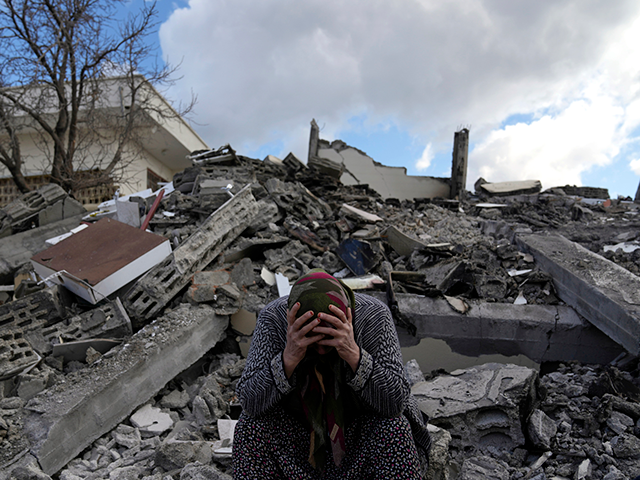The confirmed death toll from Monday’s earthquakes in Turkey and Syria passed 19,000 on Thursday.
The already horrific total, easily high enough to make the quakes among the deadliest in recorded history, will likely rise as rescue efforts for missing and trapped victims are suspended. Disruptions in much-needed humanitarian aid caused by the quake will probably result in even more fatalities.
The official count of deaths from Turkey stood at 16,546 on Thursday morning, plus 3,162 from Syria.
Rescue efforts are still ongoing, including the spectacular rescue of a pregnant woman rescued from beneath the rubble at the very epicenter of the earthquake in Kahramanmaraş, Turkey. In a more bittersweet story from Syria, a newborn baby was pulled from beneath the rubble of the village of Qatma after the child’s trapped mother died giving birth.
Many of those rescued so far have been children, and sadly, so are many of those still missing:
Some pets have also been recovered, sometimes at the insistence of their still-trapped owners:
The World Health Organization (W.H.O.) noted on Tuesday that Turkey’s government is much more capable (and, to be brutally honest, inclined) to render emergency assistance than war-torn Syria, so international assistance is more urgently needed in the latter country.
“This is a crisis on top of multiple crises,” W.H.O. Senior Emergency Officer Adelheid Marschang said at a Tuesday meeting in Geneva. “All over Syria, the needs are the highest after nearly 12 years of protracted, complex crisis, while humanitarian funding continues to decline.”
“It’s now a race against time. Every minute, every hour that passes, the chances of finding survivors alive diminishes,” said W.H.O. Director-General Tedros Adhanom Ghebreyesus.
On Thursday, United Nations Secretary-General Antonio Guterres announced that the first U.N. aid convoy passed through the Bab al-Hawa border crossing from Turkey into northern Syria. Bab al-Hawa is the only crossing that Syrian dictator Bashar Assad permits the U.N. to use for humanitarian relief.
“It included six trucks, carrying shelter and other desperately needed relief supplies,” Guterres said. “More help is on the way, but much more – much more – is needed.”
“We are sadly aware that we haven’t yet seen the full extent of the damage and of the humanitarian crisis unfolding before our eyes,” he said.
Fox News recounted more rescue stories on Thursday:
Emergency crews working through the night in the city of Antakya managed to pull a young girl trapped in the ruins of building to safety, according to news agency IHA via the Associated Press. Two hours later, they also rescued her father.
In Diyarbakir, a city approximately 300 miles east of Antakya, rescuers freed an injured woman from a collapsed building, but found three others dead next to her, according to a report from Turkish news agency DHA.
Several residents of Antakya told reporters their relatives are still buried under the rubble, with diminishing hope of rescue.
“There’s been no sound from them for days. None,” a woman named Selen Ekimen tearfully told the Associated Press about her trapped parents and brother.
Turkish officials said over 110,000 rescue personnel and 5,500 vehicles have been mobilized, bolstered by volunteers and teams from over two dozen foreign countries.
The death toll on Thursday officially surpassed the 18,000 killed by the earthquake in northern Turkey in 1999, a grim outcome hinted at by President Recep Tayyip Erdogan on Monday when he said only the cataclysmic Erzincan earthquake of 1939 with 33,000 casualties would prove to be deadlier. Casualties in Turkey and Syria have also exceeded the 18,400 killed by the 2011 earthquake and tsunami in Fukushima, Japan.
Erdogan visited the epicenter of the earthquakes on Wednesday, declaring that Turkey is “face to face with a great disaster.”
Acknowledging growing public criticism of his government’s slow response to the disaster, Erdogan conceded some shortcomings, but primarily blamed the scale of the destruction, harsh winter weather and earthquake damage to transportation infrastructure. He dismissed his critics as “provocateurs.”
“This is a time for unity, solidarity. In a period like this, I cannot stomach people conducting negative campaigns for political interest,” he said.
Kemal Kilicdaroglu, Leader of the main opposition in Turkey for the past decade and probable candidate in the next presidential election, slammed Erdogan’s management of the disaster. He said Erdogan “has not prepared for an earthquake for 20 years,” despite collecting a controversial “earthquake tax” for that purpose since the 1999 disaster. Quite a few Turkish citizens have been wondering where all the earthquake tax money went as rescue teams arrive days or hours too late to save buried victims.
“If there is one person responsible for this, it is Erdogan,” Kilicdaroglu declared.
Political analysts told Reuters on Thursday they expected the earthquake will be a major topic in the May election, as the 1999 quake was in 2002, when it played a role in bringing down the incumbent government. Istanbul’s stock exchange has plunged 15 percent since Monday, wiping out some $5 billion in value, which is very bad news for the large number of middle-class Turks who have been sheltering their income from inflation by purchasing stocks.
Erdogan, who was already facing perhaps the toughest election of his long career, announced he was activating 90 days of emergency powers on Wednesday, but insisted the May 14 election would still be held on schedule.

COMMENTS
Please let us know if you're having issues with commenting.